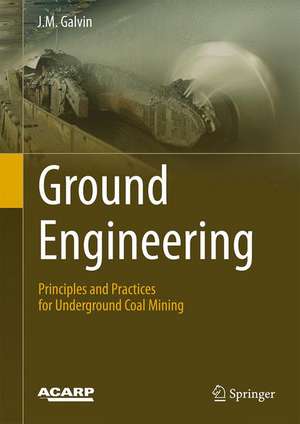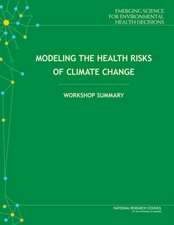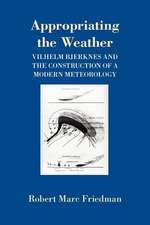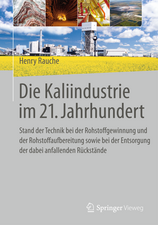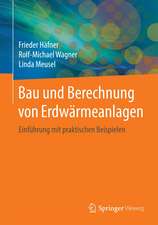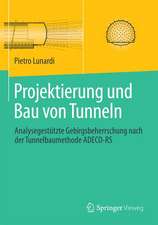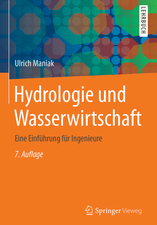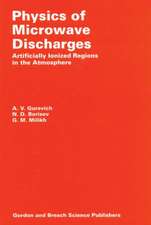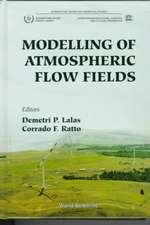Ground Engineering - Principles and Practices for Underground Coal Mining
Autor J.M. Galvinen Limba Engleză Hardback – 10 feb 2016
Readers will also learn about types of ground support and reinforcement systems and their operating mechanisms. These elements provide the platform whereby the principles can be applied to mining practice and risk management, directed primarily to bord and pillar mining, pillar extraction, longwall mining, sub-surface and surface subsidence, and operational hazards.
The text concludes by presenting the framework of risk-based ground control management systems for achieving safe workplaces and efficient mining operations. In addition, a comprehensive reference list provides additional sources of information on the subject. Throughout, a large variety of examples show good and bad mining situations in order to demonstrate the application, or absence, of the established principles in practice. Written by an expert in underground coal mining and risk management, this book will help students and practitioners gain a deep understanding of the basic principles behind designing and conducting mining operations that are safe, efficient, and economically viable.
About the author
Emeritus Professor Jim Galvin has a relatively unique combination of industrial, research and academic experience in the mining industry that spans specialist research and applied knowledge in ground engineering, mine management and risk management. His career encompasses directing ground engineering research groups in South Africa and Australia; practical mining experience, including active participation in the mines rescue service and responsibility for the design, operation, and management of large underground coal mines and for the consequences of loss of ground control as a mine manager; appointments as Professor and Head of the School of Mining Engineering at the University of New South Wales; and safety advisor to a number of Boards of Directors of organisations associated with mining.
Awards
Winner of the ACARP Excellence Research Award 2016.
The Australian Coal Industry's Research Program selects recipients to receive ACARP Research and Industry Excellence Awards every two years. The recipients are selected on the recommendation of technical committees. They are honored for achievement of a considerable advance in an area of importance to the Australian coal mining industry. An important criterion is the likelihood of the results from the project being applied in mines.
Winner of the Merv Harris Award from the Mine Managers Association of Australia.
The Merv Harris Award is named for Merv Harris who donated money to be invested for a continuing award in 1988. With the award, the Mine Managers Association of Australia honors members of the Association who demonstrate technical achievement in the Australian Coal Mining Industry. The first award was granted in 1990, since then, only two people have received this honor.
The book has received the following awards…. AGS (Australian Geomechanics Society) congratulates Dr Galvin for these awards
| Toate formatele și edițiile | Preț | Express |
|---|---|---|
| Paperback (1) | 549.31 lei 38-44 zile | |
| Springer International Publishing – 31 mar 2018 | 549.31 lei 38-44 zile | |
| Hardback (1) | 782.73 lei 38-44 zile | |
| Springer International Publishing – 10 feb 2016 | 782.73 lei 38-44 zile |
Preț: 782.73 lei
Preț vechi: 1016.54 lei
-23% Nou
Puncte Express: 1174
Preț estimativ în valută:
149.77€ • 156.38$ • 123.96£
149.77€ • 156.38$ • 123.96£
Carte tipărită la comandă
Livrare economică 01-07 aprilie
Preluare comenzi: 021 569.72.76
Specificații
ISBN-13: 9783319250038
ISBN-10: 3319250035
Pagini: 664
Ilustrații: XXIII, 684 p. 421 illus., 285 illus. in color.
Dimensiuni: 178 x 254 x 44 mm
Greutate: 2.21 kg
Ediția:1st ed. 2016
Editura: Springer International Publishing
Colecția Springer
Locul publicării:Cham, Switzerland
ISBN-10: 3319250035
Pagini: 664
Ilustrații: XXIII, 684 p. 421 illus., 285 illus. in color.
Dimensiuni: 178 x 254 x 44 mm
Greutate: 2.21 kg
Ediția:1st ed. 2016
Editura: Springer International Publishing
Colecția Springer
Locul publicării:Cham, Switzerland
Public țintă
Upper undergraduateCuprins
1. Scope of ground engineering.- 2. Fundamental principles for ground engineering.- 3. Excavation mechanics.- 4. Pillar systems.- 5. Interaction between workings.- 6. Support and reinforcement.- Systems.- 7. Ground support design.- 8. Pillar extraction.- 9. Longwall mining.- 10. Overburden subsidence.- 11. Operational hazards.- 12. Managing risk in ground engineering.- Glossary of terms and symbols.- Appendices.
Notă biografică
Emeritus Professor Jim Galvin has a relatively unique combination of industrial, research and academic experience in the mining industry that spans specialist research and applied knowledge in ground engineering, mine management and risk management. His career encompasses directing ground engineering research groups in South Africa and Australia; practical mining experience, including active participation in the mines rescue service and responsibility for the design, operation, and management of large underground coal mines and for the consequences of loss of ground control as a mine manager; appointments as Professor and Head of the School of Mining Engineering at the University of New South Wales; and safety advisor to a number of Boards of Directors of organisations associated with mining.
Textul de pe ultima copertă
This book teaches readers ground engineering principles and related mining and risk management practices associated with underground coal mining. It establishes the basic elements of risk management and the fundamental principles of ground behaviour and then applies these to the essential building blocks of any underground coal mining system, comprising excavations, pillars, and interactions between workings.
Readers will also learn about types of ground support and reinforcement systems and their operating mechanisms. These elements provide the platform whereby the principles can be applied to mining practice and risk management, directed primarily to bord and pillar mining, pillar extraction, longwall mining, sub-surface and surface subsidence, and operational hazards.
The text concludes by presenting the framework of risk-based ground control management systems for achieving safe workplaces and efficient mining operations. In addition, a comprehensive reference list provides additional sources of information on the subject. Throughout, a large variety of examples show good and bad mining situations in order to demonstrate the application, or absence, of the established principles in practice. Written by an expert in underground coal mining and risk management, this book will help students and practitioners gain a deep understanding of the basic principles behind designing and conducting mining operations that are safe, efficient, and economically viable.
About the author
Emeritus Professor Jim Galvin has a relatively unique combination of industrial, research and academic experience in the mining industry that spans specialist research and applied knowledge in ground engineering, mine management and risk management. His career encompasses directing ground engineering research groups in South Africa and Australia; practical mining experience, including active participation in the mines rescue service and responsibility for the design, operation, and management of large underground coal mines and for the consequences of loss of ground control as a mine manager; appointments as Professor and Head of the School of Mining Engineering at the University of New South Wales; and safety advisor to a number of Boards of Directors of organisations associated with mining.
Readers will also learn about types of ground support and reinforcement systems and their operating mechanisms. These elements provide the platform whereby the principles can be applied to mining practice and risk management, directed primarily to bord and pillar mining, pillar extraction, longwall mining, sub-surface and surface subsidence, and operational hazards.
The text concludes by presenting the framework of risk-based ground control management systems for achieving safe workplaces and efficient mining operations. In addition, a comprehensive reference list provides additional sources of information on the subject. Throughout, a large variety of examples show good and bad mining situations in order to demonstrate the application, or absence, of the established principles in practice. Written by an expert in underground coal mining and risk management, this book will help students and practitioners gain a deep understanding of the basic principles behind designing and conducting mining operations that are safe, efficient, and economically viable.
- Provides a comprehensive coverage of ground engineering principles within a risk management framework
- Features a large variety of examples that show good and poor mining situations in order to demonstrate the application of the established principles in practice
- Ideal for students and practitioners
About the author
Emeritus Professor Jim Galvin has a relatively unique combination of industrial, research and academic experience in the mining industry that spans specialist research and applied knowledge in ground engineering, mine management and risk management. His career encompasses directing ground engineering research groups in South Africa and Australia; practical mining experience, including active participation in the mines rescue service and responsibility for the design, operation, and management of large underground coal mines and for the consequences of loss of ground control as a mine manager; appointments as Professor and Head of the School of Mining Engineering at the University of New South Wales; and safety advisor to a number of Boards of Directors of organisations associated with mining.
Caracteristici
Provides a comprehensive coverage of ground engineering principles within a risk management framework Features a large variety of examples that show good and poor mining situations in order to demonstrate the application of the established principles in practice Ideal for students and practitioners
